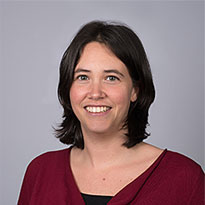Marieke Adank
Sector monitoring specialist

After completing her MSc degree in Irrigation and Water Engineering at Wageningen University, the Netherlands in 2003, Marieke started her professional career in the water, sanitation and hygiene (WASH) sector.
Marieke has been involved in (action) research in various countries, including Ghana, Ethiopia and Bangladesh on issues like small town WASH, integrated urban water management, multiple-use water services, cost recovery and financing, WASH service monitoring and evidence-based decision making. She has also been involved in monitoring, evaluation, process documentation and impact assessments of projects and programmes in the WASH sector, like UNICEF’s ZimWASH Project in Zimbabwe and Vitens’ Sustainable Water Project in Harar, Ethiopia.
She has been working closely with sector stakeholders, including Ministries (e.g. the Ministry of Water Resources, Irrigation and Electricity in Ethiopia) and government agencies (e.g. Community Water and Sanitation Agency in Ghana) in identifying and addressing sector challenges. This has amongst other resulted in the establishment of the national monitoring framework in Ghana and national guidelines for Self-supply in Ethiopia. She has also supported knowledge management and sector learning processes, especially in Ghana and Ethiopia. This has included the development of the Resource Centre Network Ghana (supported by multiple donors, including DGIS, UNICEF and BMGF) and Learning Alliance Platforms in Ghana (including the Accra City Learning Alliance under the EU-funded SWITCH Project and the National Level Alliance Platform in Ghana, established under the BMGF funded WASHCost and Triple-S Projects) and woreda and regional Learning and Practice Alliances in Ethiopia (under the DFID-funded RiPPLE Project).
After completing her MSc degree in Irrigation and Water Engineering at Wageningen University, the Netherlands in 2003, Marieke started her professional career in the water, sanitation and hygiene (WASH) sector.
Marieke has been involved in (action) research in various countries, including Ghana, Ethiopia and Bangladesh on issues like small town WASH, integrated urban water management, multiple-use water services, cost recovery and financing, WASH service monitoring and evidence-based decision making. She has also been involved in monitoring, evaluation, process documentation and impact assessments of projects and programmes in the WASH sector, like UNICEF’s ZimWASH Project in Zimbabwe and Vitens’ Sustainable Water Project in Harar, Ethiopia.
She has been working closely with sector stakeholders, including Ministries (e.g. the Ministry of Water Resources, Irrigation and Electricity in Ethiopia) and government agencies (e.g. Community Water and Sanitation Agency in Ghana) in identifying and addressing sector challenges. This has amongst other resulted in the establishment of the national monitoring framework in Ghana and national guidelines for Self-supply in Ethiopia. She has also supported knowledge management and sector learning processes, especially in Ghana and Ethiopia. This has included the development of the Resource Centre Network Ghana (supported by multiple donors, including DGIS, UNICEF and BMGF) and Learning Alliance Platforms in Ghana (including the Accra City Learning Alliance under the EU-funded SWITCH Project and the National Level Alliance Platform in Ghana, established under the BMGF funded WASHCost and Triple-S Projects) and woreda and regional Learning and Practice Alliances in Ethiopia (under the DFID-funded RiPPLE Project).
After completing her MSc degree in Irrigation and Water Engineering at Wageningen University, the Netherlands in 2003, Marieke started her professional career in the water, sanitation and hygiene (WASH) sector.
Marieke has been involved in (action) research in various countries, including Ghana, Ethiopia and Bangladesh on issues like small town WASH, integrated urban water management, multiple-use water services, cost recovery and financing, WASH service monitoring and evidence-based decision making. She has also been involved in monitoring, evaluation, process documentation and impact assessments of projects and programmes in the WASH sector, like UNICEF’s ZimWASH Project in Zimbabwe and Vitens’ Sustainable Water Project in Harar, Ethiopia.
She has been working closely with sector stakeholders, including Ministries (e.g. the Ministry of Water Resources, Irrigation and Electricity in Ethiopia) and government agencies (e.g. Community Water and Sanitation Agency in Ghana) in identifying and addressing sector challenges. This has amongst other resulted in the establishment of the national monitoring framework in Ghana and national guidelines for Self-supply in Ethiopia. She has also supported knowledge management and sector learning processes, especially in Ghana and Ethiopia. This has included the development of the Resource Centre Network Ghana (supported by multiple donors, including DGIS, UNICEF and BMGF) and Learning Alliance Platforms in Ghana (including the Accra City Learning Alliance under the EU-funded SWITCH Project and the National Level Alliance Platform in Ghana, established under the BMGF funded WASHCost and Triple-S Projects) and woreda and regional Learning and Practice Alliances in Ethiopia (under the DFID-funded RiPPLE Project).